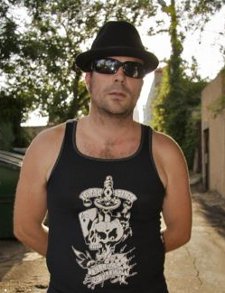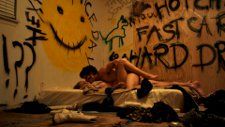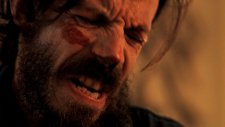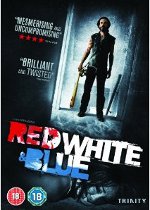
Director Simon Rumley
Writer/director Simon Rumley is one of the most artful, arresting and extraordinary contemporary British writer/directors you have quite possibly never heard of. For although his recent films like The Living And The Dead and Red White & Blue have wowed the festival circuit, they have struggled to find distribution to a wider audience in spite, or perhaps because, of their elliptical, elusive and uncompromising nature. His is a tragic brand of horror rooted not in monsters or demons, but in the darkest parts of the human psyche, and both these films are, needless to say, unmissable. Eye For Film caught up with him shortly before the UK premiere of Red White & Blue at the Film4 FrightFest 2010.
The Living And The Dead and your latest Red White & Blue have both debuted in the UK at FrightFest, but they do not feel like conventional horror films. Do you think of them as genre films, and of yourself as a genre director?
I guess both films probably had a foot in the genre world without being pure unabated genre. One of the reasons why, with Red White & Blue, I came up with that story, was that, having travelled with The Living And The Dead quite a bit and having read quite a few reviews and spoken to quite a few people about it, the response was often: "It's one of the most horrific films we've ever seen but it's not a horror film."
I liked that sense of it, because I've been watching horror films since I was about 13, much like a lot of people of my generation, with the boom of the videos and the VHS and the video nasty sort of stuff, and unlike a lot of horror directors who love anything which is unadulterated horror, my kind of influences are probably a little more classical. In later years Korean cinema – with its Park Chan-wooks and Kim Ki-duks – is a cinema which I've really responded to on a personal level. And again, those are similar.
If you look at A Tale of Two Sisters or even Oldboy, they're not really genre films but I think they appeal to genre audiences, so I think this is part of it. Probably both of my recent films have genre influences in terms of their stylisation – Red White & Blue less, actually, but certainly The Living And The Dead. So I don't think I'm an out-and-out horror director, I think I'm somebody who understands genre, appreciates it and likes it - but I'm trying to do something different with it.
If it were absolutely necessary to pidgeonhole Red White & Blue in a subgenre, the film's second half superficially lends itself to being something like 'torture porn'. I just wondered what your thoughts are on that much maligned and somewhat misnamed subgenre - and also how you think that Red White & Blue differs from films like the Hostel and the Saw franchises.

SR: We've always stayed away from the torture porn categorisation because we think ultimately it's not really that similar. I guess in terms of that one-word or two-word pitch, we've called it a revenge movie, which of course can take you to I Spit On Your Grave or Last House On The Left - but it is also Oldboy, and it's a hundred westerns, so it's something which does sit more neatly in more genres.
I saw the first Saw, I thought it was pretty good. I saw both Hostels, I thought they were fine. OK, it's fine, I don't hate it. I think the Saw film was pretty cleverly done, to be honest, it was a very interesting thriller. I haven't bothered watching any of the others. I think there's usually an assumption with those sorts of film that they're pretty poorly made, and they're poorly executed, and there's not a lot of imagination - which I think is probably a correct assumption.
Again, I say that not having seen many more than the obvious ones. Certainly with Red White & Blue it has the elements of torture porn inasmuch as there is porn and there's a bit of - you know it's not even torture, but I think that the irony is actually the torture is almost self-inflicted, at least in the case of the character Franki. So I think that the biggest difference of course is that with torture porn films it's like, "Hey, let's cut some chicks up and let's see all their limbs be severed and there will be lots of blood and it will be really fun", and there is that escapist element which is sick fun really. Red White & Blue isn't really meant to be a fun film, it's meant to be quite a serious, socially engaged film. None of this film is done for titillation.
One of the things that your film seems to do, unlike so much of the second-rate 'torture porn' that we have seen, is to ally its torture directly – or at least a little indirectly – to practices of the US army in Iraq. In a sense the title Red White & Blue reflects the film's tripartite structure, but it's also obviously referring to the colours of the American flag, which you see prominently a number of times in the film. Obviously you're English but the film is set in Austin, Texas and has American characters. What broader comments is your film making on American society, culture and politics?

The film is political with a very small p. All that you've said is absolutely correct, and I think a lot of people have got it because it's not that hard to work out really – although I don't think everyone has. I just felt it would give the film more depth and give it a slightly wider implication as to what it was about, and I think, in a very small nutshell, it's American foreign policy that violence – eye-for-an-eye tooth-for-a-tooth violence - is the best way to solve everyone's problems, which of course, time and time again, usually proves not to be the case.
With several of the characters, actually with all of them, the deaths are ultimately pretty futile, very unnecessary, and it's like all these characters have got to a crossroads in their life where they have to make a very important decision that's going to affect their lives and subsequently their deaths, and I think sadly for them they all made the wrong decision. Going back to qualifying the film and what genre it is, as much as it's a revenge movie, it's also a tragedy in the old-fashioned sense of the word, in the same way that The Living And The Dead was in the end. You know, in the end, there's a lot of futility in the violence, and you're supposed to be emotionally moved by the deaths because they just seem so pointless. I've never voted in my life, except when Tony Blair sent Britain to Iraq, and then I voted against him. So I guess that's where I'm coming from.
Red White & Blue is a film full of letters that are unread, questions that are unheard, actions that are unseen and other narrative ellipses. Was this an element of the screenplay from the very first draft, or were you constantly paring down what you had to its barest essentials?
In the end I did about six drafts. This was the fifth feature script that I've written that I've also directed, and my first three [Strong Language, The Truth Game, Club Le Monde] were completely different and completely dialogue heavy. When they came, they were compared in all the reviews with Eric Rohmer and Richard Linklater, which is very nice, but then I think at some point I decided: if I am going to carry on with my writing/directing career, if I'm going to carry on doing this, I need to change tack – you know, I've had these films, they've all come out in the UK, haven't really done much else abroad, they've had amazing reviews, but no one is seeing them.
Red White & Blue 18 Trailer from
Trinity film on Vimeo.
It's in my edit, it's all very much there in the script, and as well as a writing technique it is an editing technique, but it is very much editing on the page before you start shooting or getting into production. The Living And The Dead was a different kind of a film, because it was essentially driven more by visceral experience than by plot, but for Red White & Blue it was much more plot driven, and I didn't really want to give anything away until as late as possible, so theoretically it becomes more shocking and/or more emotionally moving.
So I think that was another part of the reason for doing that: not giving too much away and letting the audience have to work and concentrate on the film. If the film was written in, let's say, a slightly more traditional way, I think the story would be a lot less strong, because there's a lot of stuff that I deliberately cut out which happens in the script and you have to kind of fill in the blanks, and people seem to be able to do that pretty successfully. I think if we actually filled in everything that we had chosen not to, it'd probably be a two and a half hour film or something.
In their storytelling, your films deploy immense restraint, suggestive structural symmetries and an intense focus on character. Do you think this is key both to their considerable critical success, and to their relative invisibility when it comes to mainstream distribution? How do you even pitch films of such subtlety and intelligence?
Sadly on one level and happily on another level, I think you're probably right. With The Living And The Dead, I think in retrospect it's quite amazing that we got money for it, and I think that the people who gave us money never actually read the script. With Red White & Blue, definitely in its script format, a lot of people went, "Wow, this is amazing!", so that certainly had a much stronger sense of worth in terms of commercial market sensibilities.
I think that structure is something I've always enjoyed playing with, as a writer and as a director, and I think The Living And The Dead has a structure that is kind of complicated in its own way – some people say it's all over the place – but it had its own rationale in its own way. Red White & Blue is kind of linear, but I guess it's relatively unusual to have three different stories which are each part of the same story. It's not like Rashomon, where you see the same story from three perspectives. Distributors and sales agents seem the bane of a filmmaker's life, really, because it took us about a year to get a sales agent in, we'd have someone in the company who would say, "Wow, this is amazing!", and they'd show it to the boss, who'd go, "No fucking way!"

And distributors just seem to be very lazy, and just want to pick up films that they don't actually have to do any work with, which has a cool title or something. People don't seem to worry too much about the quality of the filmmaking, which can be quite frustrating. We've had someone say, "We've never seen anything like this before, so we don't have anything to compare it to, so we're not going to make an offer." That's the kind of mentality we're up against. They ask, "Who's going to watch this film?", but my feeling has always been that it's basically all the people who bought into Asia Extreme, which is actually a pretty massive crowd.
But without people having the understanding or the vision or the passion to attract that kind of market, then in the end the film just doesn't get seen. The Living And The Dead is a funny example, because it's something that could have been a lot less successful, and it could equally have been a lot more successful. It's kind of known on the genre circuit amongst certain people, but even on the genre circuit it's not always known. It's kind of a funny situation to be in, really.
You must be delighted that Noah Taylor won the Best Actor Award at the Fantasia Film Festival 2010 for his role as Nate in your film - and congratulations for winning the Best International Film Feature Award as well - but I just wanted to know whether you're slightly disappointed on behalf of his two equally worthy co-stars who went unrecognised.
It's funny, because I knew one of the people on the committee, and he told me, "I can't believe it, because I was trying to get everyone to vote for the film, but it wasn't a very cine-literate audience, and they gave the award to Noah, but I couldn't believe that they didn't give it to Amanda [Fuller, who plays Erika] as well." I actually didn't even know, until my friend on the panel told me, that we were in competition, so it came as a great – and pleasant - surprise. I think with Amanda, yeah you're right, she should have been unanimously praised, and I'm sure somewhere down the line she will get the recognition that she deserves.
I also think Marc Senter is extraordinary as Franki. I mean, it's a very thankless role, and such an unflattering one, but he just nails it in every gesture. He's so odious.
You're right, and I think out of the three he's the one person not everyone likes, and I know for certain he put a lot of soul and passion into it. I think he was inevitably a bit disappointed, as he would be. With the Erica and Nate roles, basically they fall in love, so as an audience you've got that thing to hold onto, there's a progression of character and where they're going and you can see why they exist within the film.
His role, as you say, is a lot more thankless, really, because nothing really happens. He's just a bit of an idiot, really, we see him looking after his mum, and that's very sweet, but really, beyond that, he's just this tortured soul who's very lost in his life, so it's certainly not a role that is easy to play, and I think he did a great job.
I don't know if you've seen Chris Siverston's The Lost, which was the film that I first saw him in. He has the lead in that, and if you liked him in Red White & Blue, you should try and check it out, because again it's a great lead role. I don't know if The Lost did as many festivals as we did, but every so often I'd go to a festival, and it was there, so I saw it, and again it's another cool foreign film that probably didn't get as much attention as it really should have.
What are you working on now?
We're actually casting for a radio play [Tales From Beyond The Pale]. Larry Fessenden, who is an actor/director/producer renaissance horror man, he's based in NY, and he directed Wendigo, he produced I Sell The Dead which was actually at FrightFest last year, he produced Trigger Man, which was a Ti West film before, I think it was before Cabin Fever 2, and he's actually just finished producing the next Ti West film, The Innkeepers – and he's done a lot of acting in quite big Hollywood film stuff, so he's a pretty interesting guy. He and Glenn McQuaid, who directed I Sell the Dead, they decided to get a bunch of writer/directors together. They had about 15 of us, I think it includes Ti West, J T Petty who did The Burrowers, Doug Buck who did the remake of Sisters, I think Don Coscarelli, and I think Paul Solet who did Grace.
Basically, everyone's done a 30-minute radio play. I think I'm the only English person to be doing it. So I wrote a play, and I was just going to give it to them and they were going to do it, and then they asked if I would like to produce it in the UK, and I thought, fuck it, I've never produced or directed a radio play, so I thought it could be kind of interesting. So, yeah, literally tomorrow we're getting a bunch of public speaking boys. It's actually about an ex-public school boy who's terribly British, and he marries an African girl, but at the wedding none of her family or friends are there, which everyone thinks is a bit weird – and it's about what happens when the guy goes off to meet her family in Sudan. It's called British And Proud. It doesn't turn out quite as you expect, really. Maybe it does.
And what are your next film projects?
The closest one happening is a film in China, which I don't think is actually in any way genre related. It's a thriller chase movie, kind of Duel meets Lost In Translation, and that's called Stranger. We're supposed to be shooting that at the end of year – actually, pre-production end of year, shooting at beginning of next year – and that's produced by the same guy I produced Red White & Blue with, Bob Portal. Then, I've been trying to make inroads in America, so I'm attached to one project called Crime Scenes, which is a really excellent script by a guy called T S Faull, who wrote a film called Grimm Love which is about German cannibals who eat each other – and Crime Scenes is basically about a bunch of four people who are the victims of violent crimes.
They meet at their victims' support group, and they decide that that is not really working for them, and they come up with a way to make them feel better about the perpetrators of their crimes, or the crimes towards them. If you imagine Crash, the Paul Haggis one, as written by Chuck Palahniuk, that's kind of where you're at. It could be a cool interesting modern-day film, really, in the Pulp Fiction-Fight Club-The Usual Suspects-Memento kind of mould. I've been developing the script on that for about a year, so that's really early stages. I'm also quite close to being attached to a horror film – original horror film, I should say – in the States, so there are a few things keeping me going at the moment.
 |
The Living And The Dead is available on DVD.





















